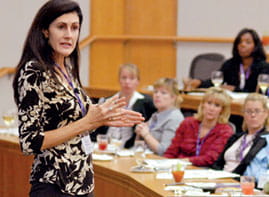What was Blagojevich thinking?
Kellogg School Professor Adam Galinsky’s research goes deep into the paradoxes of power to explain how the mighty can fall
By Matt Golosinski12/12/2008 - Less power-hungry souls may find it hard to imagine stepping onstage and grabbing the spotlight, let alone doing something perverse while all that attention is focused on them.
But according to Kellogg School Professor Adam Galinsky, this scene plays out more frequently than might be expected. He says that people and power make for some unexpected and dramatic consequences. In fact, the more power and publicity someone has, the greater the risk that this person will feel “invisible” and at liberty to pursue actions that, to an outsider, can seem ill-advised or even mad.
In the wake of recent allegations that Illinois Governor Rod Blagojevich abused the authority of his office in a “pay-for-play” scandal to appoint a replacement to President-elect Barack Obama’s U.S. Senate seat, we sought Galinsky’s insights to explain how leaders come to make such obviously poor choices.
The Morris and Alice Kaplan Professor of Ethics and Decision in Management at Kellogg, Galinsky holds a doctorate in social psychology from Princeton University and has studied power dynamics extensively. He says that, rather than “corrupting” people, power actually tends to “amplify and reveal a person’s true character.”
Power also forces important psychological changes that tend to accentuate the positive possibilities of one’s actions, while simultaneously minimizing the perception of any associated negative outcomes. As a result, says Galinsky, the psychology of power can elevate a person to greatness or result in a tragic downfall. He shared other insights about the Blagojevich case and more generally about the way that he and his Kellogg School peers are preparing the next generation of leaders to manage power responsibly in ways that benefit society.
Matt Golosinski: If the allegations of “pay-to-play” political corruption made against Governor Rod Blagojevich are true, it seems incredible that a man in his position would fail to recognize — if not the criminal nature of his behavior, then at least the personal peril associated with taking such unguarded action in the face of known FBI surveillance. What could he possibly have been thinking? Hadn’t he heard about Eliot Spitzer’s downfall as governor of New York?
Professor Adam Galinsky: The way to understand the behavior really has to do with the intersection between the person and the position. Both these people — Spitzer and Blagojevich — are governors, and the governor has the ultimate executive authority, at least within their region. Once you understand that, you have to ask, “What does power do to people?” And power has two primary effects: It really reveals the truth about who people are, and it alters basic psychological processes. It affects the relative activation of two primary neuropsychological systems, what people call the approach system and the inhibition system. The two systems combine to regulate behavior. What research shows is that power enhances or increases the action of the behavioral approach system, but it decreases the inhibition system.
MG: This sounds like something that can lead to real trouble. In the case of a Spitzer or, allegedly, Blagojevich, the outcomes are bad, but must the psychological forces inevitably lead to problems?
Prof. Galinsky: In some ways, this psychological process is a great thing. It’s what leads the powerful to be action-oriented and to be agentic and to propose optimistic visions of the future that can inspire people. The combination of these two systems ends up producing three things: It makes people more optimistic about events, both in their own life and in general; it makes them more action-oriented (in some of our studies, people who have simply thought about an experience of power have demonstrated a tendency to make the first offer in a negotiation); and it makes people take more risks. The risk-taking is mediated by the optimism. Power focuses you on all the rewards that you can get from potential action, and it leads you to be blind to the pitfalls and lurking dangers associated with that behavior. People then end up behaving in a way that seems, from an outside perspective, crazy and really risky. Ironically, this behavior can even threaten their very position of power.
MG: So even if federal agents are watching you, if you are a person caught up in this power dynamic you either don’t recognize the danger or else you think that you are above it somehow, maybe even invincible?
Prof. Galinsky: Yes, and the figure of being “drunk with power” is appropriate to consider. When people are drunk with alcohol, they are less aware of what others think of them. That’s why some people like alcohol; it’s freeing, it’s disinhibiting. And power has some of those same characteristics. What’s ironic is that when you’re in a position of power more eyes are on you, but power makes people feel relatively invisible in their behavior. You’re unaware that anyone is looking at you. For instance, one laboratory study showed that people in high-power positions were much more likely to chew with their mouths open, have crumbs fall down the front of their shirts and things like that.
MG: You are shedding light on the dynamics of central players, like a Blagojevich, but what about those around him, the second-tier actors? Is their psychology similar with respect to power, or are there key differences?
Prof. Galinsky: These people are facilitators. I don’t think they are caught up in the same [psychological process.] I think it’s a different system for them. They are in a position of power, but that position is entirely dependent upon the governor. What you’re going to see is that these people’s behavior will adapt and become just like [their superior’s] behavior.
MG: Are they likely to “speak truth to power” if they object to something that’s going on, or do they tend to be inhibited by systemic forces?
Prof. Galinsky: Let’s say they stand up and say, “I think this is a bad idea.” The person in charge might then counter, “Well I need to get a new chief of staff then.” This is an important point, and it relates to what we teach at Kellogg: Knowing when to stand up to power. There are a number of reasons that the powerful are led down the road of delusion, including changes in brain chemistry as we’ve said, but also they are not getting accurate feedback from anyone in the environment around them because everyone is sucking up to them. I teach in my leadership class at Kellogg how people in low-power positions can learn to speak up effectively to high-power people. We also show how people in power positions can learn to become a better leader by cultivating a climate that welcomes honest feedback.
MG: So it’s incumbent upon the leader to cultivate this atmosphere where colleagues feel comfortable offering feedback? That there are certain ground rules in place that facilitates this information exchange?
Prof. Galinsky: Exactly. And the ground rules involve telling me when I’m wrong.
MG: Earlier you mentioned that power reveals the true nature of a person. This seems rather different than the framework that many of us are familiar with, which is that power itself corrupts. Can you say more about this point?
Prof. Galinsky: Power reveals who people are. Because you are less constrained, because you don’t have to adapt your behavior to the perspective of others, power allows your true nature to reveal itself. In this case of the Illinois governor, we are seeing indications of a very corrupt person.
MG: So it’s not necessarily that the position of governor created this man, but the power of that office enabled the underlying proclivities of this man to emerge?
Prof. Galinsky: It’s the combination of those two things. Power leads people down a path by making them optimistic, but it also reveals their true nature. That’s an important distinction because the fact is that we have to be very careful how we select our leaders based on that knowledge. That’s what we’re trying to do at Kellogg: create better leaders with better natures, so that when they are in positions of power their better nature emerges. My Kellogg colleagues David Austin-Smith and Tim Feddersen and I created this course Values-Based Leadership and we talk about the difference between Plato’s conceptualization of leadership as a calling and a duty to help the collective society, versus Machiavelli who said, no, it’s really all about self-interest and retention of power. Psychologists like to draw a distinction between people who have a pro-social power motive and those who have an anti-social power motive. Apparently Blagojevich had an anti-social power motive. I think there’s a difference between what people like Bill Clinton and Eliot Spitzer did [marital infidelities] and what someone like Nixon did and what Blagojevich is accused of doing. Indulging your sensual nature is very different than using your elected office as a mechanism of corruption to, in some sense, alter the very fabric of government in your own personal favor.
MG: What does the Blagojevich situation and others like it indicate about the nature of our political institutions? Are we talking about power-neutral structures or, rather, structures that are already loaded with all these opportunities that people are going to get plugged into once they get into office?
Prof. Galinsky: Two things. You want to select better leaders. You want to have a more diligent process, given that people come in these two camps — pro-social and anti-social — let’s pick the pro-social power motivated individual. Second, let’s create a system in which the anti-social people don’t flourish and the system doesn’t actually create anti-social power. In Illinois, this is the fourth governor in the last 40 years who might spend time in jail. Four of the last eight if he’s convicted. That would be a 50 percent conviction rate, which, as Jon Stewart on “The Daily Show” joked, is higher than the rate of conviction for murderers. Part of the problem is that the system is corrupt and needs massive overhaul. We know from years and years of psychology research and leadership research and organizational behavior research that people are a product of the environment they find themselves in.






